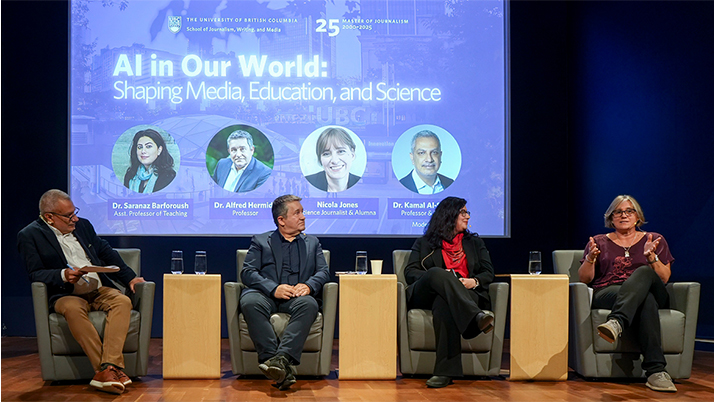During investigative reporter Robert Cribb’s talk on the ‘culture of government secrecy’ an audience member asked him how he ‘knows’ when he’s on the right track with a story. “You just get a sense,” was his reply.
This ‘sense’ is a feeling an investigator knows well. It reveals the difference between information that just passes through, and the information that stops the journalist in his tracks, spinning the inner compass that points the way to the truth.
This inner compass drives investigative reporters like Cribb to unearth the stories that are the lifeblood of the journalism profession. Investigative journalism is a relentless quest for the truth. But the truth, Cribb argued, is often hidden behind a veil of silence and secrecy at the governmental level about issues that should be a matter of easily accessible public record.
School of Journalism Director Stephen Ward said during his introduction that government silence is “the enemy of democracy and accountability.”
Cribb pointed out that Stephen Harper’s government campaigned on the premise of transparency and openness, but said that, “the exact opposite has happened. We are dealing with the most hostile government in recent history.”
During his investigations Cribb has encountered roadblocks to reporting that have made his work harrowingly difficult. According to Cribb, barriers to the truth are created when governmental bodies destroy records, fail to document decisions, deny and withhold information, and charge exorbitant fees to obtain information.
Cribb revealed that former Alberta Premier Ralph Klein had denied journalists access to public records, a “strategic way of undermining the public interest”, and that Stephen Harper’s staff attempt to manage news conferences by “picking which journalists get to ask questions.”
Cribb said there is a plethora of information relevant to the public interest that investigative journalists literally have to battle bureaucracy to get to.
“The process is flawed,” he said. “There is a black hole of public information.”
This black hole of information results when public bodies are not adequately covered by access to information legislation.
Some governmental bodies that are not held accountable to the public, because they are exempt from access legislation, include Airport Authorities, the Canada Pension Plan Investment Board, The Nuclear Waste Management Organization, The Canadian Millennium Scholarship Foundation, Foundation Genome Canada, Canadian Blood Services, NAV Canada, and others.
Cribb also reported that “more than half” of requests for court record documents are routinely denied. The greatest indictments against the public interest are committed through these information black holes.
Cribb recounted examples of the results of his investigations, such as finding that the College of Physicians was dealing with 99% of patient complaints and reports of malpractice in secret, and doctors with complaints filed against them were often given light reprimands, in private, with no transparency.
He said there are also “attempts to silence whistleblowers,” and “economic pressures to avoid delays overruling safety issues” that much of the public may be unaware of.
Cribb is frustrated that this culture of secrecy is a “sleeper issue in Canadian society,”
He believes journalists are acting on behalf of the public, but are “dealing with…antiquated legislation and [a] cultural problem. The only way things change is through public pressure…but [it’s] rarely on the public agenda,” he said.
Cribb called for amendments to Freedom of Information legislation, judicial appreciation for journalists’ relationships with confidential sources, and adequate whistleblower protection, which could enable a greater scope of investigations to come to light.
Cribb believes in the power of the people. “The public must demand greater openness and transparency from public officials,” he said.
“Without this, we remain in the dark.”
Photos by Jayson Go


